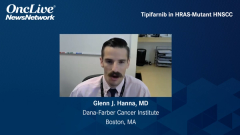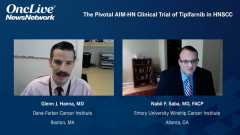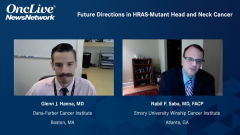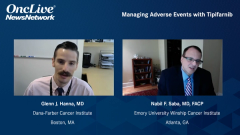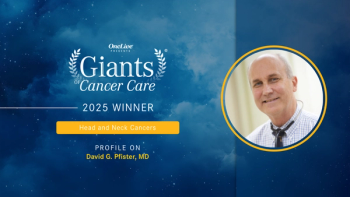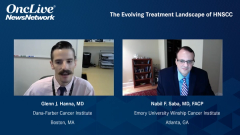
Future Directions in HRAS-Mutated Head and Neck Cancer
Glenn J. Hanna, MD, and Nabil F. Saba, MD, FACP, highlight potential new therapies for head and neck squamous cell carcinoma in various patient populations.
Nabil F. Saba, MD, FACP: Perhaps, Glenn, this is all very interesting, but to wrap things up, I was wondering what are your thoughts on future implications? What are your thoughts about how this will fit into the armamentarium in a recurrent metastatic setting and options of combination therapy? It would be nice if we can discuss this.
Glenn J. Hanna, MD: Yes, I think you made some good points before that it does seem to transcend the HPV [human papillomavirus] biologic boundary. I think we, you and I in particular, think a lot about HPV biology separately and want to try to tailor therapy even in the metastatic setting based on that. It’s also nice to see that patients, as you said, who potentially had initial immunotherapy in the first line or are platinum refractory from our more traditional agents, may benefit. What I’m taking away from this, assuming that this pivotal trial is successful, is that when patients show up with advanced incurable or recurrent metastatic disease, sending molecular profiling is crucial. And certainly, if you identify an alteration or missense mutation in HRAS, maybe regardless of variant allele frequency, we would hope that tipifarnib would be in our toolbox for those patients and get some durability.
I think further studies will be needed and might be challenging because it’s such a small population as to whether we sequence things differently. Do you give tipifarnib earlier? Should it be in the very first line, or should it be that we give it after immunotherapy? Is there some benefit to priming the immune system or exposing to chemotherapy? I think there are practical challenges; you may not have the sequencing information in front of you when you’re about to make a decision regarding systemic therapy, and you may want to get started with either an immunotherapy or chemoimmunotherapy option. It may naturally end up being more of a second-line drug, but I think that seems reasonable too, because second line right now is a pretty wide-open space for metastatic head and neck cancer. While there is some compelling evidence for cetuximab, plus or minus some other things, a lot of people are resorting to chemotherapy, traditional platinum, taxane doublets. So HRAS inhibition in the right patient would be very smart.
Then I think the same questions you’re hitting on, if someone does have benefit, can we salvage that by adding something else to it, whether that’s a PI3K inhibitor, an EGFR antibody, or some sort of EGFR pathway alteration agent? Or do we add an immunotherapy? It’s a good question, and I think it will be hard to study this population beyond this trial, only because of the small rate of patients who have these mutations. But perhaps we’ll see a subsequent small study that builds on these results as a comparator arm using those rational combinations you talked about. Certainly, the alpelisib plus tipifarnib study will be a nice next step for the evolving story of this. What are your thoughts?
Nabil F. Saba, MD, FACP: Yes, fascinating. I agree with what was stated. I always go back to what has happened in other diseases, like lung cancer. Even though this is such a rare situation, let’s remember also that the EGFR inhibition, when it started in lung cancer more than a decade ago, was very restricted to a certain group of patients who were difficult to probably get to. Then fast forward to the current situation where you have second-generation agents, you have agents that are used in the adjuvant setting. Those resulted from big international collaborations, and I think the way I look at tipifarnib and HRAS inhibition is basically the same way.
I’d like to see 5, 10 years from now a situation where we are at a better understanding of where exactly we have to use these drugs, and the field is wide open. What about definitive therapy? A patient with an HRAS alteration, should this patient be treated the same way as we currently do for patients with radiation and chemotherapy? What about maintenance therapy? What about adjuvant therapy post- definitive therapy? All these are important questions. I understand head and neck cancer is not as common as lung cancer, for example, worldwide, but certainly there’s a large number of patients with recurrent metastatic disease. I think it’s going to take a lot of effort to answer these questions, but I think we’re in the first steps of this effort, and I really hope that this will make a huge difference in patients’ lives down the line. It is already doing that.
Transcript Edited for Clarity



